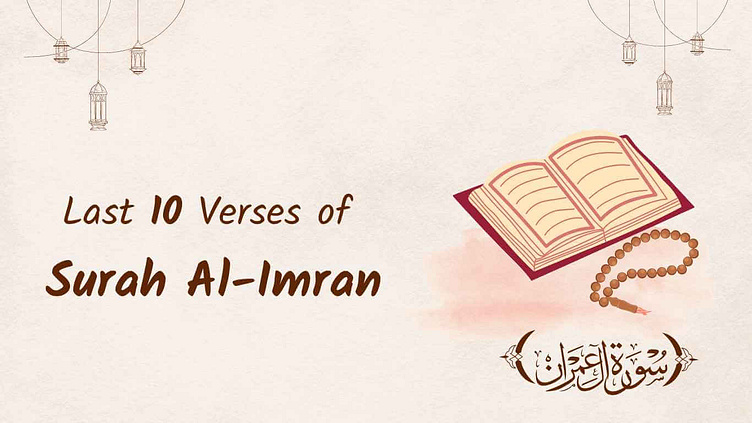The Virtues of the Last Ten Ayahs of Surah Al-Imran and Relevant
Introduction
The Holy Quran, as the ultimate source of guidance for Muslims, contains numerous verses that offer spiritual, moral, and practical instructions. Among these, the last 10 ayat of Surah Al Imran (3:190-200) are particularly significant. These verses encapsulate profound themes of contemplation, supplication, and steadfastness in faith. The virtues of these verses are further underscored by several hadiths, highlighting their importance in the daily lives of believers.
The Virtues of the Last Ten Ayahs of Surah Al-Imran
Contemplation of Creation
The verses begin with an exhortation to reflect upon the creation of the heavens and the earth:
“Indeed, in the creation of the heavens and the earth and the alternation of the night and the day are signs for those of understanding.” (Quran 3:190)
Reflecting on these signs deepens one’s understanding of Allah’s omnipotence and wisdom. It instills a sense of humility and gratitude, acknowledging the grandeur of the Creator.
Remembrance and Supplication
The following verse emphasizes the constant remembrance of Allah and the importance of supplication:
“Who remember Allah while standing or sitting or [lying] on their sides and give thought to the creation of the heavens and the earth, [saying], ‘Our Lord, You did not create this aimlessly; exalted are You [above such a thing]; then protect us from the punishment of the Fire.’” (Quran 3:191)
True believers are those who keep Allah in their thoughts at all times, seeking His protection and mercy.
Recognition of Allah’s Signs and Seeking Forgiveness
Believers recognize their dependence on Allah and seek His forgiveness for their shortcomings:
“Our Lord, indeed whoever You admit to the Fire - You have disgraced him, and for the wrongdoers there are no helpers.” (Quran 3:192)
This verse highlights the importance of seeking Allah’s protection from disgrace and eternal punishment.
Steadfastness in Faith
These ayahs also focus on the importance of steadfastness and perseverance in faith:
“Our Lord, and grant us what You promised us through Your messengers and do not disgrace us on the Day of Resurrection. Indeed, You do not fail in [Your] promise.” (Quran 3:194)
The prayer for fulfillment of Allah’s promises reflects the believers’ reliance on His mercy and justice.
Relevant Hadiths Highlighting the Virtues of These Ayahs
Hadith on the Significance of Contemplation
The Prophet Muhammad (peace be upon him) emphasized the importance of reflecting on the creation of the universe. He said:
“Woe to the one who recites these verses but does not reflect upon them.” (Musnad Ahmad, Hadith 12556)
This hadith underlines the necessity of not just reciting the verses but also contemplating their meanings and implications.
Hadith on the Reward of Remembrance
In another hadith, it is reported that the Prophet (peace be upon him) said:
“Whoever reads the last ten verses of Surah Al-Imran at night, it will be as if he has prayed the whole night.” (Sunan al-Darimi, Hadith 3473)
This hadith indicates the immense spiritual reward associated with reciting these verses, equating it to the worship of an entire night.
Hadith on Seeking Protection
The Prophet (peace be upon him) also highlighted the significance of seeking Allah’s protection as mentioned in these ayahs. He would frequently supplicate using similar words, demonstrating the importance of seeking refuge from the punishment of Hellfire:
“O Allah! I seek refuge in You from the punishment of the grave, and I seek refuge in You from the punishment of Hellfire...” (Sahih Muslim, Hadith 486)
Hadith on Perseverance and Steadfastness
The concluding verse of these ten ayahs calls for patience and perseverance:
“O you who have believed, persevere and endure and remain stationed and fear Allah that you may be successful.” (Quran 3:200)
The Prophet (peace be upon him) has said:
“The strong believer is better and more beloved to Allah than the weak believer, while there is good in both. Strive to do that which will benefit you, seek the help of Allah, and do not feel helpless.” (Sahih Muslim, Hadith 2664)
This hadith reflects the essence of the final verse, emphasizing the need for strength, perseverance, and constant reliance on Allah.
Spiritual and Practical Benefits
Spiritual Upliftment
Regular recitation and contemplation of these verses uplift the spirit, providing a sense of peace and tranquility. They remind believers of their purpose and the greatness of Allah, fostering a deeper connection with the Creator.
Guidance for Daily Life
These ayahs serve as a guide for daily living. They encourage constant remembrance of Allah, sincere supplication, and reflection on the natural world, all of which are integral to a devout Muslim’s life.
Strengthening Faith
The themes of these verses—contemplation, remembrance, supplication, and perseverance—are crucial for strengthening one’s faith. They remind believers of the transient nature of worldly life and the eternal significance of the hereafter.
Protection and Blessings
Reciting these verses is believed to invoke Allah’s protection and blessings. They are a means of seeking forgiveness, mercy, and guidance, ensuring spiritual and worldly well-being.
Conclusion
The last ten ayahs of Surah Al-Imran hold immense spiritual and moral significance for Muslims. They encapsulate key aspects of faith, such as contemplation of creation, constant remembrance of Allah, heartfelt supplication, and steadfastness. The virtues of these verses are further highlighted by various hadiths, underscoring their importance in the daily lives of believers. By regularly reciting and reflecting upon these ayahs, Muslims can strengthen their faith, seek Allah’s protection and mercy, and find guidance for both spiritual and practical aspects of life.
